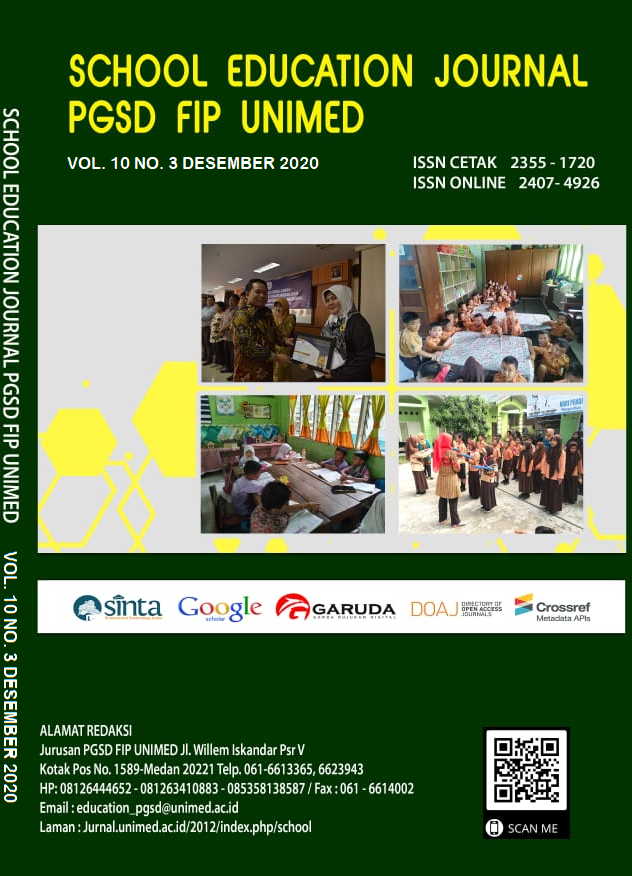PENGEMBANGAN KOMPETENSI PEDAGOGIK GURU ANAK GIFTED
DOI:
https://doi.org/10.24114/sejpgsd.v10i3.19112Abstract
The purpose of this study is to find and formulate a pedagogical competency development program for gifted teachers suitable for use in Cugenang Gifted School at the elementary school level. In this study, the authors used qualitative, research methods used were qualitative with case studies. The research subject is the principal and class teachers, in qualitative research the main research instruments are the research itself, data collection techniques, namely interviews, observation, documentation studies, and data triangulation. The results of the study are the competencies of teachers of gifted children can be seen from the results of research on gifted teachers who actively support and diligently support actively in the classroom and can be seen in terms of speaking about the competencies of 10 teacher competencies and pedagogical competencies based on research results, we support that gifted teachers have maximally and special ideal with the needs of gifted children. Keywords: Gifted Children, Pedagogic Competencies, QualitativeReferences
Andini, D. M & Supardi E. 2018. Kompetensi Pedagogik Guru Terhadap Efektivitas Pembelajaran dengan Variabel kontrol Latar Belakang Pendidikan Guru. Jurnal Pendidikan Manajemen Perkantoran, Vol. 1 No.2.
Anggara, R., & Chotimah, U. 2012. Penerapan Lesson Study Berbasis Musyawarah Guru Mata Pelajaran (MGMP) terhadap Peningkatan Kompetensi Profesional Guru PKn SMP Se-Kabupaten Ogan Ilir. Jurnal Forum Sosial, 5(2), 188“197. Retrieved from http://eprints.unsri.ac.id/1421/%5Cnhttp://eprints.unsri.ac.id/1421/1/Penerapan_Lesson_Study_berbasis_MGMP_PKn.pdf
Davis, G. A., Rimm, S. B., & Siegle, D. 2011. Education of The Gifted and Talented (6th). Boston: Pearson.
Hairunnisyah Sahidu, et al. 2013. Penyuluhan tentang Lesson Study (LS) untuk Meningkatkan Kompetensi Pedagogik Guru-Guru di MAN 2 Mataram. Journal of Chemical Information and Modeling, 53(9), 1689“1699. https://doi.org/10.1017/CBO9781107415324.004
Hidayat, Rahmat. 2013. Pedagogi Kritis: Sejarah, Perkembangan dan Pemikiran. Jakarata: Rajawali Pers.
Jhon M. Echools dan Hasan Shadily. 1984. Kamus Inggris-Indonesia. Jakarta: Gramedia.
Khamdan, dkk. 2012. Strategi Pembelajaran Pendidikan Agama Islam di sekolah (Teori, Metodelogi, dan implementasi). Yogyakarta: Idea Press.
Landvogt, J. 2001. Affecting eternity: Teaching for talent development. Roeper Review, 23(4), 190“196. https://doi.org/10.1080/02783190109554097
Mills, C. J. 2003. Characteristics of effective teachers of gifted students: Teacher background and personality styles of students. Gifted Child Quarterly, 47(4), 272“281. https://doi.org/10.1177/001698620304700404
Munandar, Utami. 2009. Pengembangan Kreativitas Anak Berbakat. Jakarta: Rineka Cipta
Rogers, Karen B. 2014. Pendidikan Anak-anak Berbakat dan Bertalenta. Jakarta: Indeks.
Rusman. 2010 Model-model Pembelajaran Mengembangkan Profesionalisme Guru. Jakarta: PT Raja Grafindo
Santrock, John W. 2010. Psikologi Pendidikan, Edisi Kedua. Terjemahan Tri Wibowo B. S Educational Psychology, 2nd Edition. Cetakan Ke-3. Jakarta: Prenada Media Group.
Subadi, T. 2013. Lesson Study Sebagai Inovasi Pendidikan. Surakarta: Kafilah Publikasi
Supranoto, H. 2015. Penerapan Lesson Study Dalam Meningkatkan Kompetensi Pedagogi Guru Sma Bina Mulya Gadingrejo Tahun Pelajaran 2015/2016. Jurnal Pendidikan Ekonomi, 3(2), 21“28. https://doi.org/10.24127/ja.v3i2.330
Zhang, Z. 2017. Gifted education in China. Cogent Education, 4(1), 1“12. https://doi.org/10.1080/2331186X.2017.1364881
Downloads
Published
Issue
Section
License
Authors whose manuscripts are approved are approved as follows:
The publication rights for all journal manuscript materials published/published on the SEJ (School Education Journal) E-Journal site are held by the editorial board with the author's knowledge (moral rights remain with the manuscript authors).
The formal legal requirements for accessing this electronic digital journal article are subject to the terms of the Creative Commons Attribution-ShareAlike (CC BY) license, which means that E-Journal SEJ (School Education Journal) has the right to store, transfer media/format, manage in the form of a database, maintain, and publish articles without asking permission from the author as long as the author's name remains as the copyright owner.
Manuscripts published/published electronically are open access for educational, research, and library purposes.

